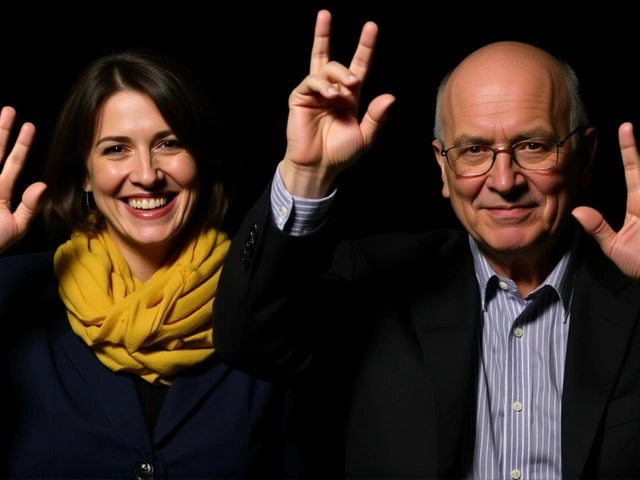
On October 10, 2025, 50 Cent, the Brooklyn-born rapper and entrepreneur whose 2003 debut Get Rich or Die Tryin' defined a generation of hip-hop, dropped two jaw-dropping AI-generated remixes on his Instagram — turning gritty street anthems into velvet-smooth 1950s-style R&B ballads. The posts, viewed over 12 million times in 48 hours, featured a soulful, crooning version of 21 Questions and a hazy, string-laden reinterpretation of God Gave Me Style, complete with a vintage photo of 50 Cent styled like a Motown crooner. The twist? No human singer touched the vocals. The voice? Entirely synthetic. And yet, it felt hauntingly real.
"This Feels Good. WTF Is Going On Now?"
In captions accompanying the videos, 50 Cent, whose real name is Curtis James Jackson III, didn’t just share music — he challenged the industry’s assumptions. "Now this shit is hot," he wrote beside the 21 Questions remix. "I'm a use AI on all my unreleased songs and see what I got for ya!" The second post, featuring God Gave Me Style, drew a more reflective response: "This feels good [too], WTF going on now, this version lets you see my vision. It's softer!" His comments weren’t performative. In an interview with Complex’s Jordan Rose, he explained: "If it will reach someone that I missed — someone who couldn’t hear what I was trying to say in the writing — they can hear it now in that format." He paused, then added, "I don’t know where the AI got these voices from, but these are some good voices. Like, if these guys came out in that time period, they would have been competition for the guys that were there." It’s a striking admission from an artist who built his brand on raw authenticity. The original versions of these songs were laced with street narratives, aggression, and the kind of emotional armor that defined early 2000s rap. Now, the same lyrics — about love, doubt, and survival — float over lush orchestration, muted horns, and a vocal tone that could’ve been pulled from a Sam Cooke session."You Can’t Beat AI. You Gotta Work With It"
When pressed on the ethics of AI in music — especially from artists who’ve spent decades fighting for creative control — 50 Cent didn’t flinch. "You want to fight something? I don’t like fighting fights I can’t win," he told HipHopDX in October 2025. "I don’t think you can beat AI. I think you need to go with it. We need to look at how we create businesses that work well with it — and perform faster as it progresses. It’s not gonna stop." His stance is pragmatic, almost business-school-level. He’s not denying the disruption. He’s betting on it. As CEO of G-Unit Records and G-Unit Film & Television Inc., he sees AI not as a threat to his legacy, but as a new distribution channel — one that can reintroduce his catalog to listeners who might never have clicked on a rap track from 2005.And it’s working. Comments on his Instagram posts flooded in from unexpected corners: 40-something R&B fans who never cared for rap, jazz enthusiasts who mistook the AI vocals for a lost Aretha Franklin outtake, even college music students analyzing the harmonic progressions. "Dozens of comments praised his songwriting ability and melodic sensibilities," noted HipHopDX, suggesting the AI didn’t just change the sound — it revealed something deeper in the writing.

Timbaland, Rogan, and the New Music Frontier
50 Cent isn’t alone. Earlier in 2025, Timbaland, the Grammy-winning producer from Norfolk, Virginia, launched TaTa, an AI-generated artist under his Miami-based Stage Zero. TaTa, Timbaland told AFROTECH, is "a living, learning, autonomous music artist." He’s not just producing music — he’s cultivating a digital persona with evolving taste.Even Joe Rogan, host of the wildly popular Joe Rogan Experience, weighed in. After hearing an AI remix of 50 Cent’s Many Men — transformed into a 1960s soul lament — he told comedian Carrot Top: "It’s not even a real human being’s voice, and it’s fucking good, dude. It’s good where you’re like, ‘Whoa.’ It seems weird hearing these lyrics with this kind of singing..." Then he added, quieter: "AI is fucking scary." That duality — awe and unease — is the heartbeat of this moment. The technology doesn’t just mimic voices. It recontextualizes emotion. A line like "I got a lot of enemies, I got a lot of problems" — once a boastful warning — now becomes a whispered confession over a Hammond organ.

What This Means for Music’s Future
The implications stretch far beyond 50 Cent’s Instagram feed. Record labels are scrambling to audit back catalogs for AI-releasable material. Independent artists are using AI to recreate the sonic textures of eras they never lived through. Music schools are debating whether to teach production or AI curation.And here’s the quiet revolution: 50 Cent isn’t replacing himself. He’s expanding his reach. His original tracks still exist — but now, they have cousins. Versions that speak to grandparents, not just gangsta rap fans. The AI didn’t erase his voice — it gave it wings.
"It’s not about replacing humans," he told Complex. "It’s about making sure your message doesn’t die because the world changed." The real question isn’t whether AI can make music. It’s whether we’re ready to listen — differently.
Frequently Asked Questions
How did 50 Cent create the AI versions of his songs?
50 Cent used AI tools trained on 1950s–1970s R&B vocal samples and instrumentation to reinterpret his original vocal tracks. The AI re-synthesized his lyrics with new melodic phrasing, harmonies, and vocal timbres modeled after artists like Sam Cooke and Marvin Gaye. He did not sing the new versions himself — the vocals are entirely machine-generated, though he provided the original lyrics and approved the final output.
Why is this different from other AI music projects?
Unlike AI-generated tracks from scratch, 50 Cent’s project reimagines existing, copyrighted material with emotional and stylistic transformation — not just genre-switching. The AI preserved his lyrical intent while radically altering the delivery, creating something that feels like a lost soul record from the past. This approach, grounded in legacy material, makes it more provocative than synthetic pop or novelty AI songs.
Is this legal under copyright law?
Legally, it’s a gray area. While 50 Cent owns the original compositions, AI-generated vocals using training data from other artists’ recordings could raise issues under U.S. copyright law, particularly if the AI mimics protected vocal styles. So far, no lawsuits have been filed, but the Recording Industry Association of America is monitoring the trend closely, especially as more artists follow suit.
What’s the audience reaction telling us about music’s future?
The overwhelming positive response from non-rap audiences suggests AI can bridge generational and genre gaps in ways traditional marketing can’t. Listeners who dismissed 50 Cent as too aggressive are now engaging with his emotional depth — not through remixes, but through reinterpretation. This signals a future where music is less about genre labels and more about emotional resonance, regardless of how it’s made.
Are other artists doing the same thing?
Yes. Timbaland’s AI artist TaTa is actively releasing music under a fictional persona, while indie producers are using AI to recreate the sound of 1970s funk and 1980s synth-pop from scratch. But 50 Cent’s project stands out because it’s not creating a new artist — it’s giving new life to his own legacy. That personal stake makes it more than a tech experiment; it’s a statement on artistic evolution.
What’s next for 50 Cent and AI?
He’s reportedly working on a full AI-reimagined album titled Lost Sessions: The Soul Edition, set for release in early 2026. It’ll include 12 unreleased tracks from his vault, transformed into R&B, gospel, and even jazz standards. He’s also in talks with streaming platforms to create "AI Mode" filters that let listeners toggle between original and AI versions of classic tracks — turning catalog music into an interactive experience.




